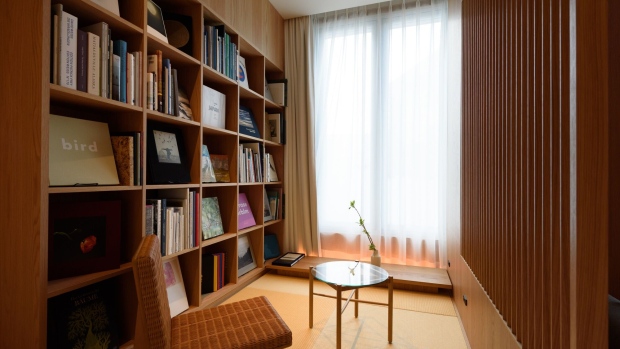(Bloomberg) — Muji is bringing its minimalist aesthetic to the home.
The Japanese retailer, known for its simple, monochrome stationery, apparel and homewares, expects no-frills homes and hotels to be just as in demand, with a growing number of Muji-style accommodations at home and abroad. We are planning to increase the number of Abroad.
“The concept is to build a huge accommodation service,” said Hidetomo Nagata, executive officer and head of social goods and space design at the brand's parent company, Ryohin Keikaku Co., Ltd., in an interview. “Muji products are still strong, but we would like to expand into new lifestyle areas.”
Earlier this month, Ryohin Keikaku announced MUJI STAY, a new business that brings the retailer's existing hotels, residences, and camps under one umbrella. In the future, we will continue to renovate existing inns and hotels that are aging or lacking in quality, and add projects such as “MUJI room,'' a space equipped with amenities such as bedding and pajamas. Funding for a full renovation.
Ryohin Keikaku, which will report its annual results on Friday, has seen strong growth in Japan, East Asia and the Americas. At the same time, the brand recently filed for administration of his Muji Europe Holdings in the UK due to poor performance. According to the company's January report, profits in the ASEAN region have also declined due to upcoming renovation costs and weak sales in Singapore, and sales in mainland China remain below levels from two years ago.
Muji could tap into new sources of revenue by leveraging its minimalist-chic philosophy. Boutique hotels, or small accommodations with a local feel, are on the rise, with the market expected to grow from $99.5 billion last year to $155.7 billion by 2030.
“We have a variety of facilities, and we believe this will be a source of revenue for our business,” Nagata said.
MUJI currently operates three hotels, one in Tokyo's upscale shopping district of Ginza, and one each in Beijing and Shenzhen, China. Nagata said rooms are often filled months in advance, indicating that new rooms may be available not only in Asia but also in the United States and Europe.
This minimalist brand also helped breathe new life into the housing complexes and public and semi-public housing built to support Japan's post-war economic recovery. Muji sought to attract residents seeking affordable housing by updating kitchens and bringing outdated features up to date. Daisuke Aiba of Iwai Cosmo Securities said the project was likely the starting point for Muji's plans to focus on housing and hotels.
“The renovation of the housing complex was quite successful,” says Aiba. “Their thought process is that if they keep expanding that model, they can increase sales.”
A key part of the company's strategy centers around Airbnb rentals called MUJI BASE in Japan's culturally rich regions. Operating in more remote areas than Muji's urban hotels, this rental facility introduces visitors to places they might not otherwise be able to visit. Located in Kamogawa, about a 90-minute drive from Tokyo, this hotel is a renovated 100-year-old traditional wooden Japanese house near picturesque mountains and rice fields.
“We're not targeting famous locations, but rather remote locations and old houses, so we're trying to create a model with less competition,'' says Aiba.
Muji plans to open about five more rental rooms and rooms this year, including one in Teshima later this month and another in Otaki, a prefecture next to Tokyo, this fall. Muji said it has received inquiries from local governments who would like to introduce such accommodations in their towns.
Nagata said the broader goal is to encourage people to stay longer and visit destinations multiple times, and the company's 2030 vision is to provide high-quality, affordable products. He said that he aims not only to sell products, but also to have a positive impact on the local community and society. their inhabitants.
Mr. Nagata says, “I hope that in the future, MUJI fans will become local fans.''
©2024 Bloomberg LP

